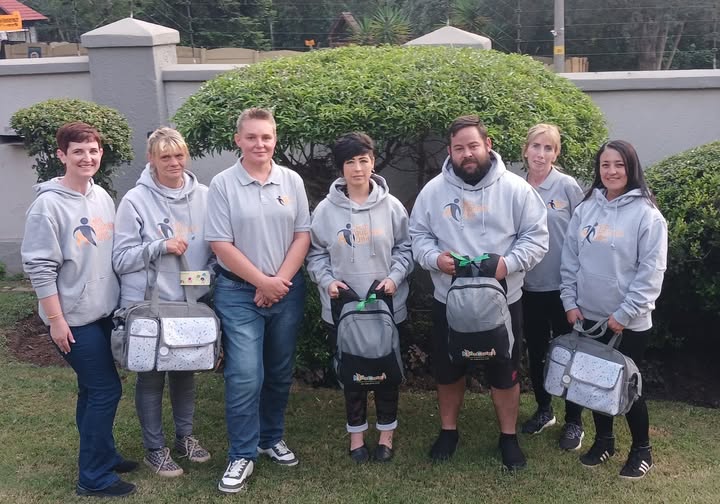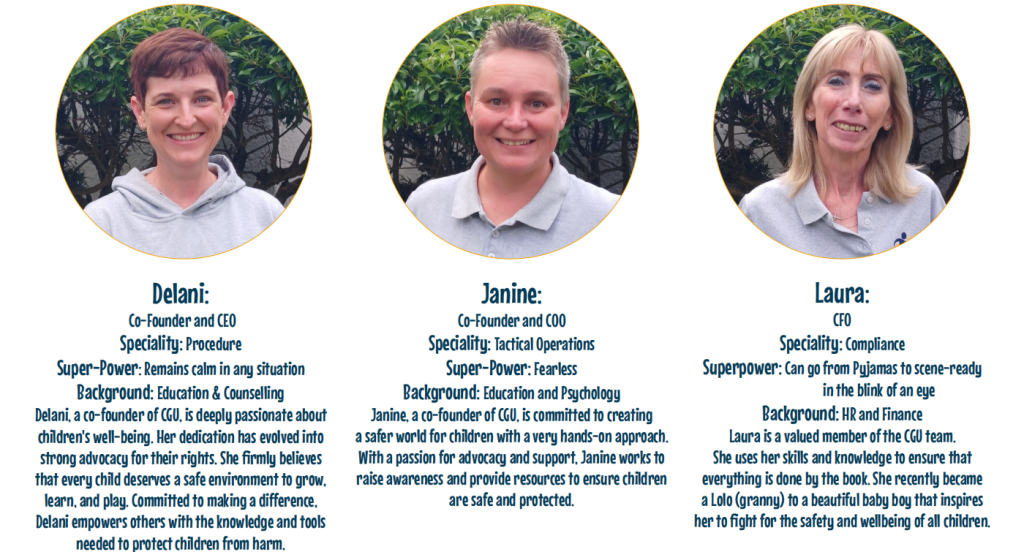We are a resource hub for children in need of intervention. We co-ordinate with all stakeholders in situations that involve children, such as:
We provide training to organisations such as: SAPS, NGO’s, First Responders, Schools.
We provide procedural assistance in cases involving children.
Our network includes: SAPS, CPF, Social workers, NGO’s, Special Needs Organisations, Schools, Prosecutors and Attorneys, Magistrates, The Childrens’ law centre, Nurses and Doctors, Private Investigators and Security Companies ETC.
We help children to understand their rights.

Since 2020, 5078 children have been murdered in South Africa.
Twenty eight children are violently attacked in South Africa every day, three of them don’t survive.
One in every three adolescents reported having suffered a form of sexual abuse at some point in their lives.
3500 babies are abandoned annually, 2 out of 3 don’t survive
47 children are raped daily
51 children are kidnapped daily
Crimes against children are a grave concern, as they significantly affect the mental, physical, and emotional health of children. Healing from the trauma of abuse can be a prolonged process spanning several years.
Ensuring children are safeguarded against any type of violence is a fundamental right secured by the Convention on the Rights of the Child.
In South Africa, there are high rates of reported violent offences, encompassing murder, rape, aggravated assault, robbery, property crime, and vehicle hijacking.
Among these, rape emerged as the most frequently reported crime to law enforcement for children aged 17 and below, followed by common assault and assault resulting in GBH.
The consequences of child sexual abuse typically encompass teenage pregnancy, diminished self-esteem, feelings of worthlessness, a lack of trust in adults, and a distorted perception of sexuality. Depending on the severity of these repercussions, some children may even develop suicidal tendencies or engage in self-harm.
Estimates suggest that about 3,500 babies in South Africa experience child abandonment each year, making it a significant and distressing issue.
However, the true extent of the problem remains uncertain due to underreporting and the absence of comprehensive official statistics.
Approximately 65% of abandoned children are newborns, and 90% are under the age of one.
It is estimated that only one-third of abandoned children survive, with many cases going unreported, especially when infants are left in hazardous locations.
Globally, it is estimated that 1.2 million children are trafficked each year. South Africa serves as an origin, transit, and destination country for human trafficking.
Children are being exploited for forced labour, sexual exploitation, and other forms of abuse.
Child abuse rates in South Africa are alarmingly high due to a combination of historical, social, economic, and cultural factors. Here are some key reasons why child abuse is so prevalent:
This is where we step in. We’ve established a robust network of professionals—including lawyers, advocates, SAPS officials, social workers, places of safety, NPOs, medical experts, and first responders—
to bridge the gap in intervention resources for children in need of care and protection.
Additionally, we offer specialised training on child protection, covering both procedural and operational aspects, tailored for first responders and individuals working with children in crisis.


Training is essential to ensure the protection and proper treatment of children in crisis.
This training outlines children’s rights, child protection measures, and the legal responsibilities of authorities when dealing with minors.
Without proper training, responders may unintentionally violate these rights or fail to provide the necessary care.
Educating them helps ensure that children are treated with dignity, their best interests are prioritized, and they receive appropriate intervention and support in emergencies.
We provide this training to First Responders, SAPS, Security Companies, NGO’s, Schools and individuals.
This includes procedural and operational training on how to deal with a variety of scenarios involving children in crisis.
* An overview of the Children’s Act
* Rights and Responsibilities
* Child Protection
* Alternative Care
* Children in conflict with the Law
* First Responders Protocols
* Monitoring and Reporting
* Forms and documents related to children in crisis
* Lost and missing children
* Abandoned babies
* Case Studies and real life examples
If you or your organisation requires training, please contact us on janine@cgusa.co.za
We charge a small fee for training to cover our overhead costs. Training includes detailed training manuals.
Be the Voice They Need! Every child deserves safety, love, and a future full of possibilities.
As an ambassador for The Child Guardian Unit, you can be a powerful advocate for vulnerable children, raising awareness, inspiring action, raising much needed funds and making a real impact — because every child deserves a Champion.
Be the Action They Need! It takes some really special people to get children out of desperate situations and get them to safety.
Being a CGU Safe Adult Volunteer means being on the ground in tough situations to assist our Guardians in emergency situations.
You can make a tangible difference in a child’s life – because every child deserves a Hero.
Your expertise can change a child’s life. Whether you’re a legal expert, counselor, doctor, nurse, first responder or have othervaluable skills, you can make a powerful impact in the fight for child protection. Lend yourtalents to support,
advocate, and create a safer world for children. Become a skilled resource today—because every child deserves a bright future!
Coming Soon: The CGU Mommy Club for Babies in Distress
Coming Soon! Watch this space!
Your financial support will assist us with our operational costs for interventions with vulnerable children.
Every contribution, big or small, helps us protect children from harm and gives them the chance to thrive.
Make a difference today—because every child deserves hope.
Section 18ATax certificates available on request
© 2025 Proudly Powered By MinuteSteak Legacy Web Studio